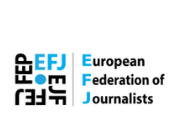Getting real about diversity and talent: 10 recommendations (2019)
Europe’s newsrooms are still predominantly white and middle class, though societies are changing at rapid speed. How to better reflect all members of the increasingly diverse European societies within Europe’s Media and public sphere is crucial. While lots of attention in digital transformation focuses on tools, much less is devoted to people, who have to master these tools after all. This is a mistake.
EFJ study on new business models to promote journalism (2019)
New media? The digital era is here! The technological evolution, the digitisation process of the past decades has radically changed how news and other media content are produced, circulated and received. It has changed audiences and consumers patterns. And it is causing disruption in the media sector and transforming the economic reality of journalism.
Rights and Jobs in Journalism: Building Stronger Unions in Europe (2016)
The media industry is undergoing drastic changes due to the emergence of new technologies in the way news are produced and consumed as well as the structural changes driven by the economic crisis. The emergence of online journalists, social media journalists, multimedia journalists, entrepreneurial journalists and many other forms of doing journalism has not only challenged the traditional notion of being a journalist, it has also led to demand for jobs, new skills, training and protection of their professional and social rights.
COVID-19 and the rise of journalistic product innovation (2021)
The past year, while difficult, brought about great product innovation in the journalism industry. User-centred product development, which had taken root in 2019, became the focus for big and small news organisations globally in 2020.
Newsroom Guide: Journalism in the Age of Pandemics (2021)
Designed to help you navigate 2021, the new newsroom guide is a distillation of expert views and advice, drawn from the World Editors Forum Science in the Newsroom project. It covers newsgathering, storytelling, innovation, and will help you think about the immediate future.
Editors share their 2021 outlook (2020)
In response to the coronavirus pandemic, news organisations ramped up their coverage in the scientific and health domains, with some partnering with scientific institutions to augment their reporting and make up for cutbacks on specialist journalists due to shrinking budgets.
Against this backdrop, it hardly comes as a surprise that many survey respondents say they will increase their focus on these topic areas in the next year.
4 takeaways on change in local media – from a Table Stakes coach (2020)
Coaching is about structure, language and asking the right questions – with unexpected inspiration from some rapidly changing local publishers in the US.
Technology guide & directory 2020/21
This annual publication looks at some of the leading trends and technology facing news publishers and features advice leading experts in the industry. Crucially, it features our directory of solutions providers to the industry to help publishers take key decisions.
In our Facts & Figures report, we explore the data and results on digital news use in Flanders and Wallonia. This policy brief focuses on changes in news use, trust and paying for news over the last five years and key attitudes regarding misinformation and journalism.
COVID-19 information on Social Media in Europe: A threat or a blessing? (2020)
Europe has been facing unprecedented challenges from COVID-19. Providing citizens with accurate, timely and frequent information about the health risks posed by COVID-19, as well as measures they can take to protect themselves, is key to mitigating the spread of the virus. Social media can, in this context, become an essential tool as it allows us to reach and engage a large number of people.
***
Media- related pilot projects co-funded by the European Commission:
- Pilot Project: Media councils in the digital age
- Pilot Project: EU grants for small-scale online media: supporting high-quality news products and tackling fake news
- Pilot Project: Media ownership monitor
- Pilot Project: Media freedom and investigative journalism
- Pilot Project: Internship opportunities for Minority Language Media
- Pilot Project: Media4Change – Future Investigative Story Lab
- Pilot Project: Fostering qualitative media by rewarding reliable sources – Journalism Trust initiative
- Pilot Project: The European Fourth Estate – Fourth Power – protecting democracy through investigative journalism and actions against Fake News
- Pilot Project: Enhancing Audience-Supported Collaborations for Empowered Media and Societies
- Pilot Project: “Exposing the Invisible – Building capacity for journalists and other media actors to conduct safe cross-border, cross discipline integrated online and offline (IOO) investigations”



